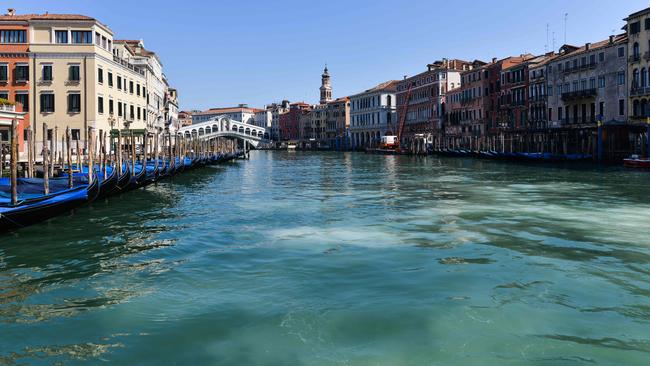Demand for greener travel a challenge for airlines
Australians’ appetite for more sustainable travel is growing – are airlines keeping up?

Business
Don't miss out on the headlines from Business. Followed categories will be added to My News.
Growing demand for more sustainable travel has only escalated throughout the Covid pandemic with Australians among the most enthusiastic proponents of low impact mobility.
Research undertaken by travel booking site Skyscanner showed three-quarters of the 1190 Australians surveyed said they believed it was vital to make travel more sustainable, with a third convinced it was even more important now than before the Covid crisis.
Visible changes in the environment as a result of reduced travel were thought to be behind the mindshift, such as clear canals in Venice and the lack of air pollution over Hong Kong.
To that end, almost half, or 49 per cent, of respondents said they would consider carbon offsetting a flight next time they booked, and 41 per cent said they would pay extra for a flight that was more environmentally friendly.
Choosing a travel destination was also being influenced by greener attitudes, with almost half committed to visiting places that were less crowded and seeking out authentic experiences representative of local culture.
With regards to air travel, the survey respondents ranked more fuel-efficient aircraft the most important initiative for reducing carbon emissions, followed by emerging technologies, such as fossil fuel alternatives and electric planes.
Skyscanner vice president of consumer affairs Martin Nolan said the changing attitudes of travellers was something the airline industry was well aware of, with the International Air Transport Association committed to net zero flying by 2050.
“Whether it’s operational efficiencies, such as lightweight cabin equipment, single-engine taxiing, or the development and adoption of new technologies and greener aviation fuel, these are the foundations of an industry-wide shift to reduce CO2 emissions from air travel,” Mr Nolan said.
“We expect to see renewed global action and commitments from governments, the travel industry and leaders in this space committing to eco-fuel targets and action on reducing carbon emissions.”
Individually, airlines were pursuing their own green agendas to achieve the ambitious IATA target, in the knowledge a new generation of passengers would shun them if they failed.
Air New Zealand recently announced a partnership with Airbus to develop a fleet of hydrogen and/or electric powered aircraft, and Qantas has committed $50m over 10 years to develop a sustainable aviation fuel industry.
The flying kangaroo was also striving to remove 100 million single use plastics from flights and “green its fleet” with more fuel efficient Boeing 787-9s and A350s.
But it was widely acknowledged that fuel alternatives were the only realistic path to reach net zero 2050, at the same time as airline activity continued to grow.
Although the technology was there, the scale was not, with current production of sustainable aviation fuels generating about 100 million litres a year, or 0.02 per cent of what was needed.
IATA director-general Willie Walsh said by 2050 the scale of the aviation industry would require the mitigation of 1.8 gigatons of carbon.
“A potential scenario is that 65 per cent of this will be abated through sustainable aviation fuels,” Mr Walsh said.
“We would expect new propulsion technology, such as hydrogen, to take care of another 13 per cent and efficiency improvements will account for a further 3 per cent. The remainder could be dealt with through carbon capture and storage, and offsets.”
He said whatever the path to net zero, airlines would not be able to do it alone with a supportive government policy framework needed to deliver the massive change.
“The costs and investment risks are too high otherwise,” Mr Walsh said. “Limiting flying with retrograde and punitive taxes would stifle investment and could limit flying to the wealthy.”
More Coverage
Originally published as Demand for greener travel a challenge for airlines




